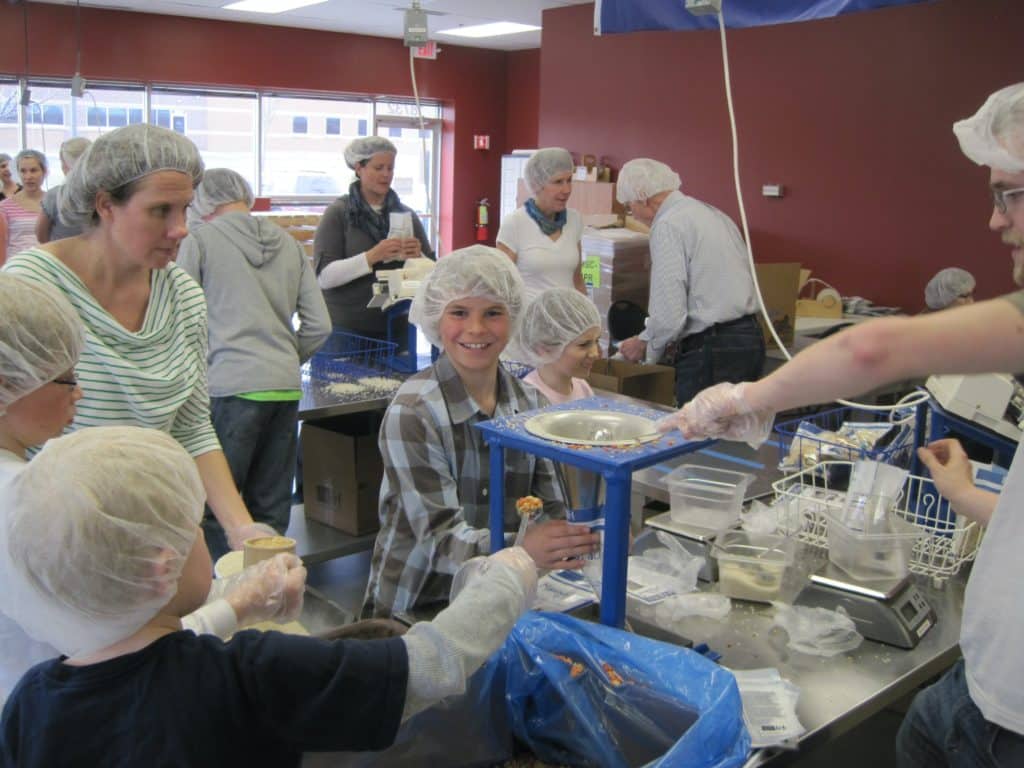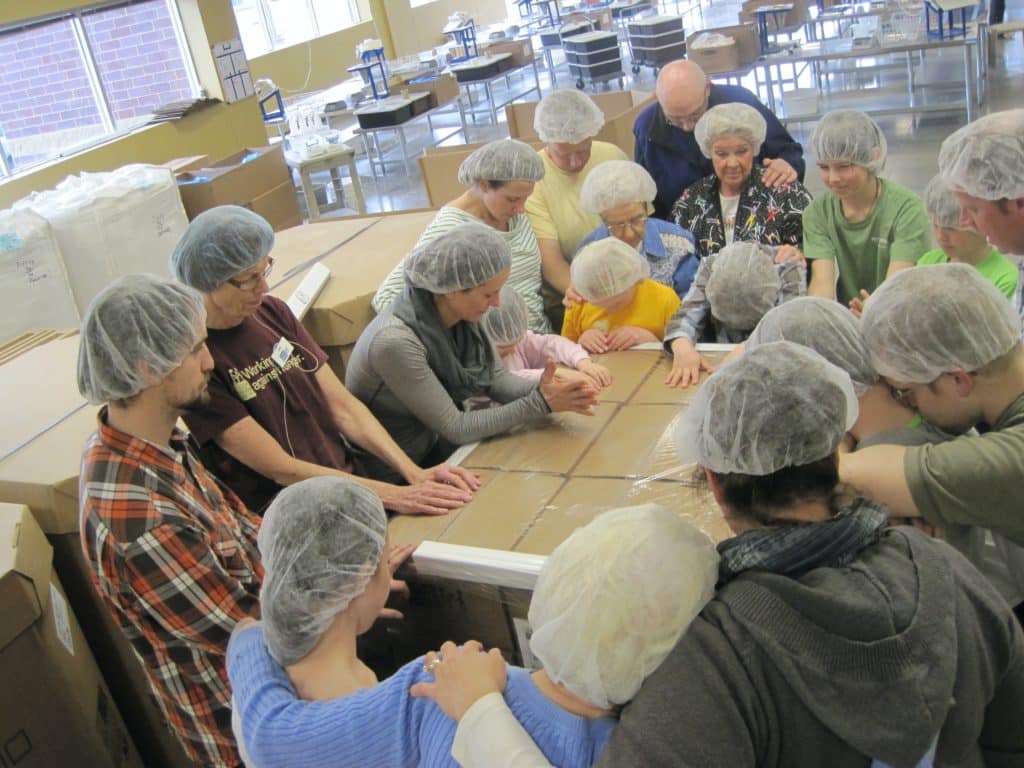
The Simple Birthday Party: Teach Your Kids to Be Generous on Their Special Day

You stand in the Walmart aisle with a cart full of princess or superhero party crafts, games, and decorations, not to mention a ton of party food. The temptation is to plan every detail to create the perfect day for your child and their friends. That’s how parents should show love to their children, right?
But, as you’re thinking about how to host a birthday party, it might be worth pausing and asking yourself, “What do I want my child to learn from this birthday?” You do want your child to come out of the day feeling celebrated and loved. But you also have the opportunity to teach your child (and the kids who come) a more profound lesson in generosity through a simpler birthday party and an intentional switch in focus.
So consider joining the revolution of simple birthday parties that also have a mission.
What is a simple birthday party?
The joy of a simple birthday party is that you get to define it. If you’re a corporate event planner turned stay-at-home parent, your definition of simplicity might differ from another parent’s. That’s okay because if loving others through planning parties gives you life and the opportunity to be Jesus’ hands and feet, then go for it! The point isn’t where you draw the line. The point is that you determine at the outset you will not spend your effort or financial resources on aspects of the party that don’t support your values.
The goodie bags: A practical example of putting your values first in a simple birthday party
For some moms, a thoughtful goodie bag may be a way of celebrating and loving others. However, so often, these bags are given out for no reason beyond that it’s what everybody does. Stuffed with sugar and cheap toys (often lost or broken before the day is over), they have little to do with anybody’s values and more to do with outward expectations. These bags are a great example of things parents inadvertently do that can send messages of entitlement to the kids at the party:
- You are entitled to more sugar than the snacks, cake, and ice cream at the party.
- You deserve a gift because you gave a gift.
- Extravagant birthday parties are the standard to meet.
Keep reading for ideas on how to send messages to your guests that you can all feel good about based on your family’s values.
Plan a simple birthday party with your child based on your family’s values
If you want to change that pattern, you can talk with your child about why you want to do things differently this year. Then, talk with your child about how to set a different example and plan a party that expresses your values. Here are some questions you could discuss:
- What are the most important ways to bless a child who comes to our party?
- How can we be sure not to waste the money God has given us on things that don’t really matter?
- How can creativity help us have a great time in a simple way?
- Are there others we want to bless who won’t be at the party (for example, a local soup kitchen or a mission overseas)? How can we use the birthday party as an opportunity to bless them as well?
How to host a birthday party focused on eternal treasure, not more stuff
So what about the glut of excessive gifts your child may receive? Brainstorm with your child how to shift the focus from getting more stuff to building up treasure in heaven. How can you make the world a better place by hosting this birthday party? Even young children know it’s not about simply getting more stuff. (This doesn’t require entirely eliminating presents either.)
- Invite kids to bring a food shelf item or a book for a lending library or shelter as their gift.
- Suggest that grandparents or family members give coupons for fun experiences or creative learning outings to do together instead of giving multiple gifts.
- “Thank before you bank.” If there are toys given, thank you notes are written before toys are played with.
- “Give as you get.” Help your child choose toys from their current stock (to match the number they received) to give to kids who have very few toys. Then, your child can determine whether the toys go to a shelter, Goodwill, or other thrift store. You can pray with your child for the toys to be a blessing as you drop them off together.
- Provide supplies for a fun craft for each child to make. The “birthday child” can bring the creations to a nursing home/assisted living facility.
- (For a smaller party…) Kids could decorate their cupcakes during the party, decorate a few extra, and bring a few decorated cupcakes over to an elderly neighbor.
- School-aged kids could participate in a food packing event for crisis hunger situations.
- As you’re setting kids up to be a blessing, notice the joy they’re experiencing. Help kids pay attention to their joy and its meaning: “You are created for the joy of blessing others!” Maybe even share one of the scriptures at the end of this article.

Above: Our nephew’s food-packing birthday party – find the smiling birthday boy!
Below: Praying over the finished box of food.

These ideas could seem like a setup for disappointment if kids expect a more extravagant birthday party; however, they may actually have a more meaningful and memorable experience!
Research shows that children are happier when they give their own treats away than when they give an identical treat that doesn’t belong to them. “People tend to assume that toddlers are naturally selfish,” said Dr. Lara Aknin. “These findings show that children are actually happier giving than receiving.”
Certainly, this is not always the case since we can all be prone to selfishness at times, but these kinds of opportunities for altruism can significantly impact kids.
A sweet, out-of-the-box example
One mom writes,
“As a child, one of my favorite birthday parties was one in which I received no presents at all! I was four or five, and an area of the world in which we had a friend working had just experienced a significant crisis. There was a desperate need for multivitamins, so my parents asked what I thought about asking for multivitamins instead of presents. I loved the family friend who was serving in this country and thought it was a great idea. I had a blast repeatedly counting how many bottles of multivitamins we received and calling our family friends to let them know about them! I never missed the presents. This memory has influenced what birthdays look like for my own kids.”
The point of all this is to counteract the way birthdays and birthday parties can feed unbiblical values of:
- “It’s all about me.”
- “How things look is what’s important.”
- “My value is related to having and giving stuff.”
You can host a simple birthday party that matches what you believe
You’ve got this! Capitalize on the opportunity to host sensible, simple birthday parties that model and strengthen biblical values of:
- “We are created to be a blessing, and it is a joy!” The one who blesses others is abundantly blessed; those who help others are helped. (Proverbs 11:25 MSG)
- “Hospitality honors God and blesses others.” Contribute to the needs of the saints and seek to show hospitality. (Romans 12:13). Do not neglect to show hospitality to strangers. (Hebrews 13:2)
- “Our money and possessions are gifts from God to be used for His purposes.” Everything comes from you, and we have given you only what comes from your hand. (1 Chronicles 29:14b)
There is no formula for how this shift in birthday parties might look. It’s up to you. Work it out with your child, and have fun. Even something as “ordinary life” as a birthday party can be an opportunity to powerfully shape values, character, and faith in your children!
So whether you eat or drink or whatever you do, do it all for the glory of God.
1 Corinthians 10:31

Know your strengths.
Your best mom or dad instincts are exactly what your kids need. So identify them. Take the free Parenting Strengths Assessment.




